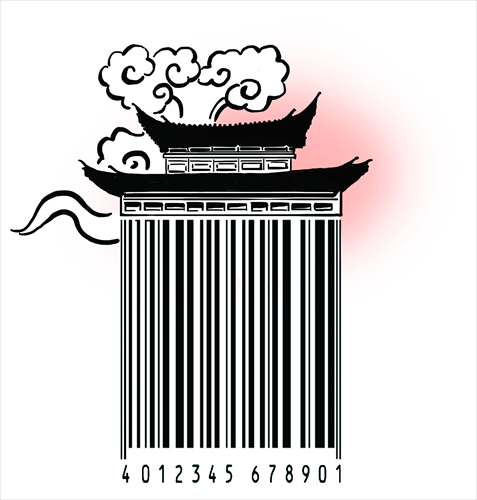Knickknacks drown out Lijiang culture

Illustration: Liu Rui/GT
Another busy travel season has kicked off in China despite the large crowds and unbearably hot weather.
At the beginning of this summer, people couldn't wait to make their travel plans. Domestically, cooler and more tranquil ancient towns have topped travel lists during this peak season.
Lijiang Sanyi Airport has added several international and domestic airlines to attract more tourists during this summer. Lijiang, located in the northwestern part of Yunnan Province, is a prestigious old town listed by UNESCO as a World Heritage Site.
The town is known for mild temperature, winding cobbled paths, weather-beaten wooden attics and harmonious fusion of different cultures and ethnic groups, most famously described by 1940s resident Peter Goullart in his book Forgotten Kingdom.
Nonetheless, Lijiang has in recent years been hit by criticism for its highly commercialized atmosphere. Media images show shoulder-to-shoulder crowds, peddlers selling tacky souvenirs no different from other tourist sites, and cheap hotels aimed at providing a quick dirty weekend for city couples.
Many even warn you that you will be discouraged by finding travel delays and grumpy tourists instead of a voyage for the soul.
They make it seem like the blue sky, clear rivers, picturesque bridges and looming snow mountaintops can now only be found in the history books and postcards in the town.
There is no denying that Lijiang's original character has somewhat been marred by commercialization, but some media outlets and travelers have gone a little too far in castigating the town's commercialization. On my trip there earlier this month, it still retained a historic townscape of outstanding ingenuity.
Delicate ornaments carved with traditional scenes, exquisitely designed screens, elaborate arches, gates, windows and roof beams decorated with wood sculptures of musical instruments, animals and flowers, all of them tinged with the local traditions and cultures.
Though most of the boutiques are run by Han, the original residents, notably the Naxi people, still live all across the old town.
Indeed, there are more than 1,000 shops in Lijiang, selling myriad handicrafts, textiles, tea in packages or in bulks, different flavors of pancakes, to name just a few. This may create a wrong impression for tourists that the city is being commercialized in an excessive way and gradually losing its uniqueness.
It should be noted, however, that Lijiang has been a key commercial and strategic site since at least the 7th century, and in particular the northern part of the town was a famous trading center in Yunnan. At its peak, there were over 1,600 shops in the town, no less than today.
It is more justified to say that Lijiang needs improvement to achieve mature development, rather than draw the simple conclusion that it has been too commercialized.
A local guy told me that the pu'er tea, a renowned Yunnan specialty, sold in many shops is fake. "If you're not an expert on tea, you'd better not buy it inside the town," she said.
This sounds quite disappointing because tourists, both home and abroad, might have rather a poor impression upon Lijiang if they find the tea they bought isn't genuine.
For this ancient town, commercialization is not the core issue. But the shallowness of much of the commerce there is devouring public confidence in Lijiang.
To alleviate people's increasing concerns that the original culture, blending traditions of different ethnic groups, will be lost, we should further explore the cultural history and present of the city and carry them forward, so as to set a paragon for other ancient towns mired in a similar plight.
If proper policy adjustments can be adopted, Lijiang will remain a fascinating tourist destination, with melodious Naxi music, the splendid Dongba culture and unique Mosuo dance.
The author is a Global Times reporter. wangxiaonan@globaltimes.com.cn